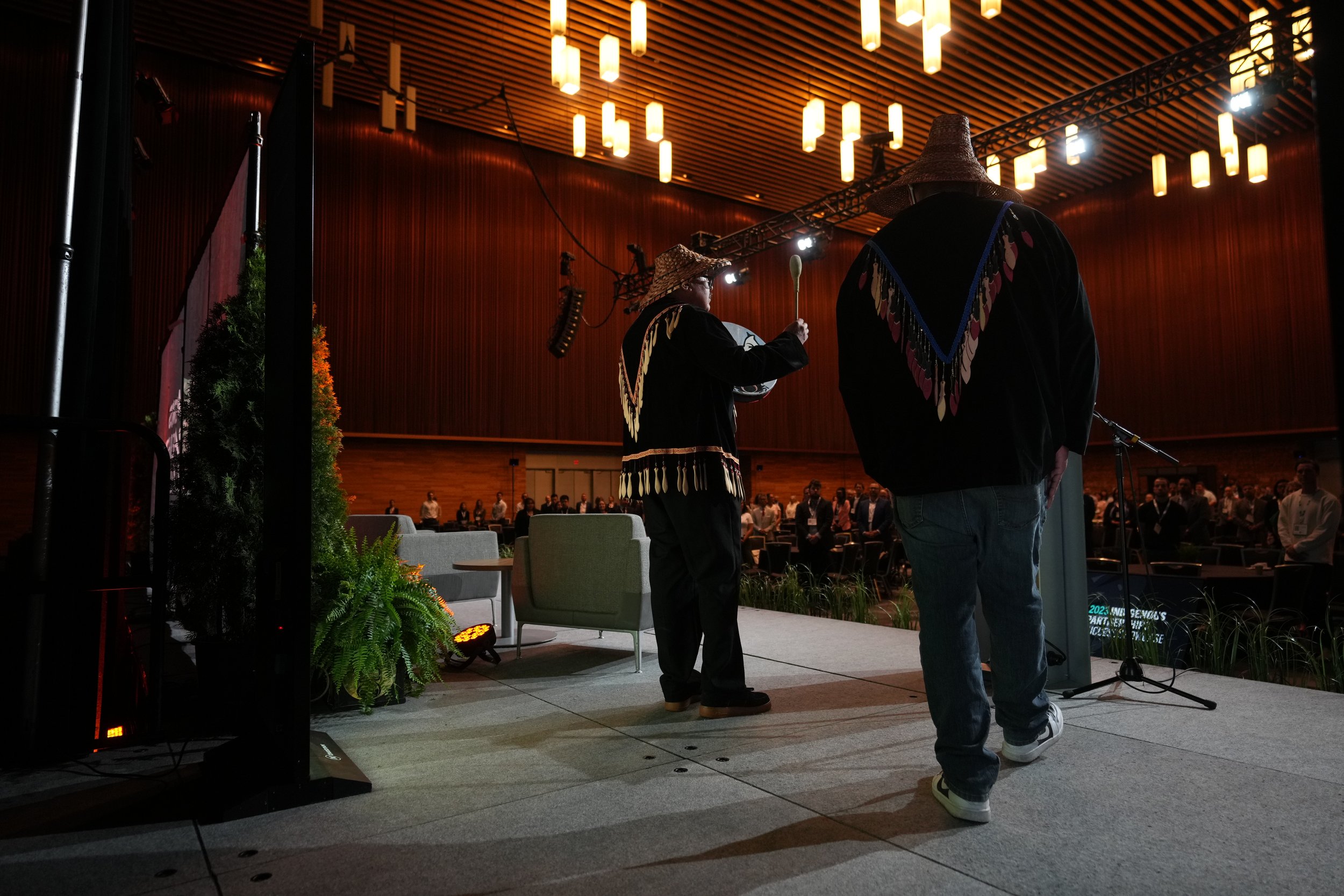The Promising Future of Equity Partnership in Reconciliation
Navigating Just Transitions, Resource Rights, and Community-Centered Development in the Energy Industry with Caoimhe Laird
Across Western Canada, Indigenous-led energy projects are emerging amidst calls for a just transition in the industry, recognition of Indigenous rights, and an acknowledgment of the need to rebuild industry–Indigenous relationships. Indigenous communities across Canada are increasingly investing in energy initiatives, energy efficiency measures, and natural resource extraction projects that centre community members as decision-makers, owners, and beneficiaries.
Such transitional ownerships look towards an alternative more people-centered economic approach to resource extraction. Through economic development and the building of business capacity within these communities, First Nations can begin to reclaim control over the resources, wealth, and health of the land through community decision-making.
In the pursuit of reconciliation in resource extraction, equity partnerships and Indigenous co-ownership on projects have shown immense promise when elevating the voices of communities within industry, specifically when it comes to community development. Indigenous ownership poses a proactive approach to community involvement by offering practical applications of procedural justice, equity, and public empowerment that cultivate and nurture spaces where these outcomes are the primary goal of social and economic policy.
The concept of community-owned natural resource projects particularly highlights the importance of justice, drawing on themes such as procedural justice—how decision-making occurs; distributive justice—how energy costs and benefits are allocated; and restorative justice— addressing injustices caused by ongoing resource extraction. Research on the topic of community ownership focuses on Indigenous leadership in the development and carrying out of projects, to align with traditional ecological philosophies and provide space for Indigenous knowledge to be applied to project procedures.
Indigenous stakeholders can offer valuable expertise in regard to interacting with and obtaining resources from the land and how it can have a positive impact on the function and success of this specific industry.
Community ownership provides a direct pathway to community-led decision-making through the presence of natural laws in project design, consideration for future generations, and intergenerational engagement with knowledge keepers and youth. With that said, the varying levels of economic development across Indigenous communities require additional support from both government and private sector players, who have been the sole benefactors of resource extraction up until now.
Opportunities for capacity building, knowledge-sharing, and mentorship from private sector energy leaders are an increasingly promising path forward for the future success of Indigenous-owned energy projects, promoted through mentorship, funding, and leadership programs.
The role of central governments can, moreover, catalyze, inhibit, and shape projects through funding mechanisms and consistent policy positions that transform social norms and overall support for community-led extraction. This involves building new narratives around Indigenous engagement through public policy and legislation that communicate the socio-economic and environmental benefits of an inclusive ownership transition.
This phenomenon is enforced by the significant success of the Haisla Nation in securing an environmental assessment certificate from the British Columbia (BC) provincial government to move forward with development in 2023. The Cedar liquefied natural gas (LNG) is the largest First Nations-owned infrastructure project in the country and will employ approximately 500 people during construction and uphold 100 full-time jobs once operational. It will allow for unprecedented economic opportunity for both the Haisla Nation and for the communities within the region, not only in the short term when creating new jobs but also for long-term benefits through continued monitoring and maintenance by the nation.
Furthermore, the granting of the environmental certificate through the government of BC signifies support for economic reconciliation and establishes a precedent for the nation to take control of future decision-making and economic endeavors. We see here that Indigenous communities are not simply residents or interest groups on a territory but an authority with the power to decide issues concerning their natural resources, demonstrating the promise of responsible advancement of LNG development in BC while protecting the environment.
From the Cedar LNG, ambitious ownership pursuits have continued to grow across Western Canada. As the Canadian federal government looks to sell the Trans Mountain pipeline, a range of Indigenous groups seek to buy a stake in the infrastructure.
A notable group, known as Project Reconciliation, aims to not own a stake in Trans Mountain directly but to facilitate the transaction for Indigenous communities and assist in the financial and technical administration of the ownership partnerships.
Additionally, under the Project Reconciliation proposal, Indigenous communities along the pipeline route would take on a governance position through Trans Mountain Corporation’s board of directors. Here, community decision-making, along with equitable inclusion, is established as a basis for community engagement.
The emergence of Indigenous interest in project ownership and equity partnerships, along with the growing support from industry break new ground when it comes to opportunities available across the extraction industry. Partnerships between community and industry show immense promise as Indigenous entrepreneurs and leaders regain their voices.
As the elements of power and identity have become exceedingly relevant across industry conduct, Indigenous communities have become more powerful players in the industry landscape, and the call for reconciliation has become louder. A framework centered on sustainable relationships is needed, where communities can begin to utilize the power that they have to shape future development to value sustainability and caring for people. Such a framework allows for the creation of a space where communities can make informed decisions about how their land, ensuring needs are met.
These authentic relationships involve taking proactive measures such as employment creation and skills development to recognize the needs of members of the territory and the communities within. This dimension is intentionally relevant when acknowledging stakeholder relationships, where ongoing discussions and interactive elements involving stakeholder interactions and networks create, maintain, and enhance an extraction sector company’s ability to operate, succeed, and create value for all stakeholders.
Join us for IPSS 2024 on June 5-6, 2024. Indigenous peoples are overcoming barriers. They're succeeding, and they're redefining what Canada can become. It's time to celebrate their success.
Get your tickets and learn more.

